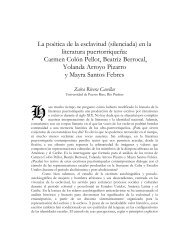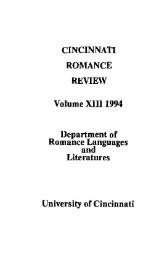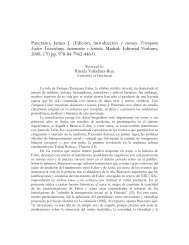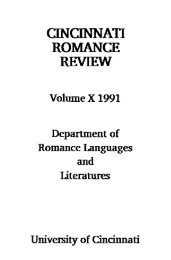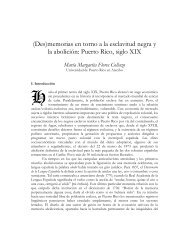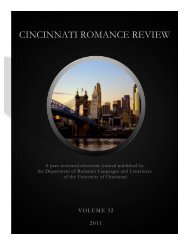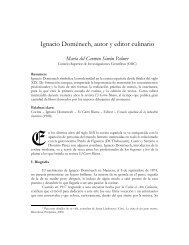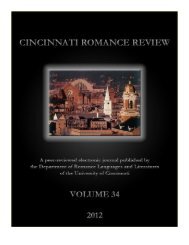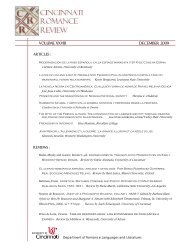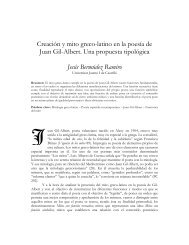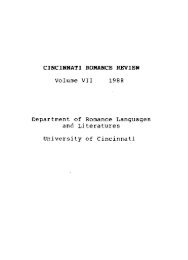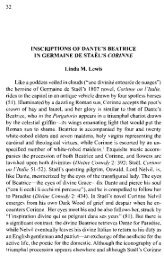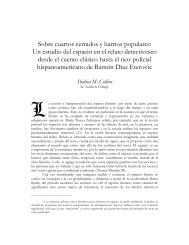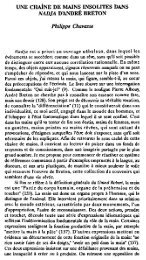Volume 30 (2011) - Cincinnati Romance Review
Volume 30 (2011) - Cincinnati Romance Review
Volume 30 (2011) - Cincinnati Romance Review
You also want an ePaper? Increase the reach of your titles
YUMPU automatically turns print PDFs into web optimized ePapers that Google loves.
WOMANISM AND SOCIAL CHANGE 127<br />
triumph. The chant of “voces” also supports Antígona’s argument to follow Natural<br />
law. In this way, Antígona’s plight and goals, although very personal, are taken up by the<br />
whole community and become fundamental for its definition. Besari’s tragedy as those<br />
of Greek theatre is never simply about the fate of individuals. The presence of a chorus<br />
is a sign of the wider significance of the enacted event, of the involvement of other<br />
human beings in constructing social and individual meanings that facilitate the interplay<br />
of both realms. Furthering the emphasis on representation of social issues, it should<br />
also be pointed out that other characters in this play are unnamed. “Hombre primero,<br />
hombre segundo and tercero” similarly to “Soldado uno, dos and tres” expand the<br />
possibilities of representation of citizenry, accentuating a general spirit of collective<br />
striving. In this sense, the play stresses the importance of the social, the community<br />
rather than the individual. And Antígona becomes relevant as a mirror for her own<br />
society and the role women can play in it.<br />
By focusing on the social through the rewriting of the classic Antigona,<br />
Morgades Besari’s play advances some lines of analysis for the definition of Equatorial<br />
Guinea after Macias Nguema’s regime. Her own writing can contribute to building a<br />
new postcolonial period. As her compatriot Donato Ndongo affirms about the labor of<br />
writing about that country:<br />
El escribir supone también la posibilidad de anticipar, por medio de la<br />
palabra, las estructuras que puedan llevar al bienestar social, puesto que<br />
si la palabra es el eslabón entre el pensamiento y la acción, el escritor es<br />
el intermediario por excelencia. La literatura se justifica, sobre todo,<br />
porque contiene las ideas básicas de una sociedad, las expresas y las<br />
ocultas, las concretas y las abstractas, las realizadas y las frustradas. (39)<br />
By incorporating African dances, drum talking and by increasing the role of the<br />
chorus in the play, Morgades Besari reinforces the dialogue her play can establish with<br />
the audience of her country, expanding the cultural references beyond the theme of the<br />
dictatorship towards a rich communal corpus of knowledge. Intertwining both, the<br />
topic of democracy and law and the culture where that topic is debated, Morgades<br />
increases the power of her play and the capability of transforming her society. As<br />
Osofisan (the author of Tegonni: An African Antigone, 1999) says, there are two urgent<br />
problems for African writers: “first, the dilemma of creating a national identity of our<br />
disparate ethnic communities; and secondly, that of creating committed, responsible,<br />
patriotic, and compassionate individuals of our civil populations”(6). In this sense, she<br />
participates of a conception of art practiced by the ancient African storytellers, in which<br />
the narrative is never gratuitous, but serves an ethical and edifying purpose.<br />
Morgades’ Antígona establishes a clear communication with the classical<br />
Antigone and its long history of being read as a symbol of reflection on citizenship.<br />
Criticizing Macías Nguema’s dictatorship, Morgades transposes the settings from<br />
<strong>Cincinnati</strong> <strong>Romance</strong> <strong>Review</strong> <strong>30</strong> (Winter <strong>2011</strong>): 117-129.



